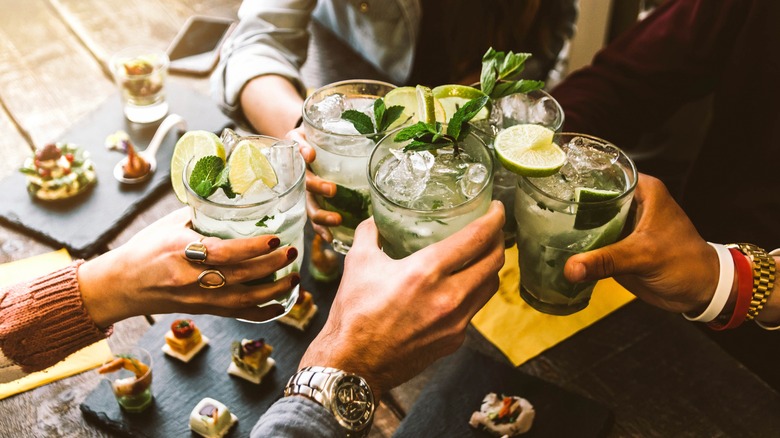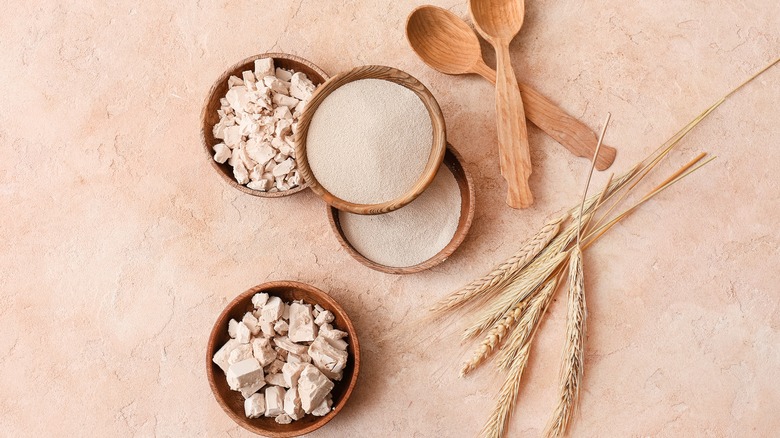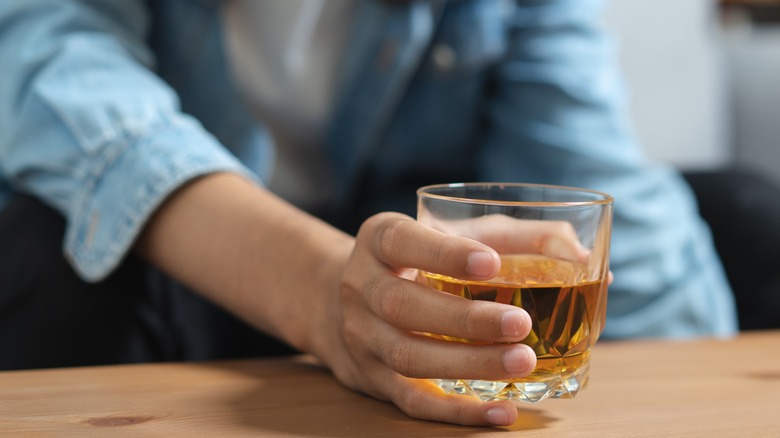Does Eating Yeast Actually Stop You From Getting Drunk?
Wouldn't it be great if you could drink as much as you wanted without getting drunk? According to American entrepreneur Jim Koch, that might be possible by using a simple trick: eating a small amount of dry yeast. "One teaspoon per beer, right before you start drinking," he said in a 2015 interview with Esquire. Kosh mixes the yeast into yogurt, but that's a matter of personal preference. You can simply eat it as-is or mix it with food, fruit juice, protein shakes, or tea.
Yeast is a type of fungus that helps improve food texture, flavor, color, and overall quality. It plays a vital role in the fermentation process and can be used to make bread, wine, beer, cider, coffee, and even chocolate, explains a 2020 review published in the journal Microorganisms. Most types of yeast feed on the starches and sugars in food, converting them into ethanol, or alcohol, and carbon dioxide. This versatile ingredient can also add a savory, umami flavor to dishes and enhance their appeal.
However, saying that yeast can prevent you from getting drunk seems unrealistic, and there are no studies to support this claim. Even so, Kosh swears by it for a more enjoyable drinking experience. With that in mind, let's see what the experts think about it.
Could yeast be the secret to a hassle-free drinking experience?
Jim Koch, co-founder of the Boston Beer Company, is a regular attendee at beer festivals in the U.S. and overseas. Part of his job is to sample different brews to discover new flavors and get inspiration for his recipes. But, as Koch told Esquire, he supposedly never gets drunk because he eats a tiny amount of dry yeast before boozing. The entrepreneur prefers Fleischmann's dry yeast, but any other brand will do the trick.
Koch learned this trick from Joseph Owades, Ph.D., a biochemist who created the world's first recipe for light beer, according to The Washington Post. Owades discovered that alcohol dehydrogenases (ADH), a group of enzymes in dry yeast, can degrade alcohol molecules and prevent ethanol from entering the bloodstream, notes Esquire. Koch says that ADH doesn't cancel out the effects of alcohol, but it can mitigate them.
Alcohol dehydrogenase is also produced in the liver, explains the Protein Data Bank. This enzyme protects against environmental toxins, including ethanol, steroids, and other compounds. Along with yeast, it also plays a key role in alcoholic fermentation. After conducting several studies, Owades reportedly found that ingesting yeast right before drinking can lower blood alcohol levels by 20% to 38%, reports Forbes. However, his research has never been replicated or published in peer-reviewed journals.
What does the research say?
While it's true that yeast can break down alcohol, it doesn't seem to have this effect upon ingestion. "The pH of the stomach varies from 2 [to] 4 but will be at 2 when you are eating. My guess is that the combination of pH 2 and active digestive enzymes will make it unlikely that yeast ADH can work well," Robert A. Sclafani, Ph.D., a Professor Emeritus at the University of Colorado, said to Forbes in 2014. Simply put, stomach acid will destroy the yeast and cancel out the effects of ADH.
Some types of yeast can survive in the stomach, but it's hard to tell how yeast ingestion impacts alcohol metabolism. (There are no studies in this regard, Forbes noted.) Jim Koch may have developed a tolerance to alcohol — and hence his ability to drink a lot without getting intoxicated. According to Family Recovery Specialists, alcohol tolerance is largely determined by genetic factors, but it can also develop over time. However, excessive drinking can affect your health, even if you have a high tolerance to alcohol.
On the positive side, millennials are less likely to get drunk than older generations because they think it's embarrassing. For the rest of us, there's no magic pill to prevent drunkenness and hangovers, but we can avoid these issues by using common sense. Simple things, such as choosing low-alcohol drinks and eating beforehand, can make all the difference.


